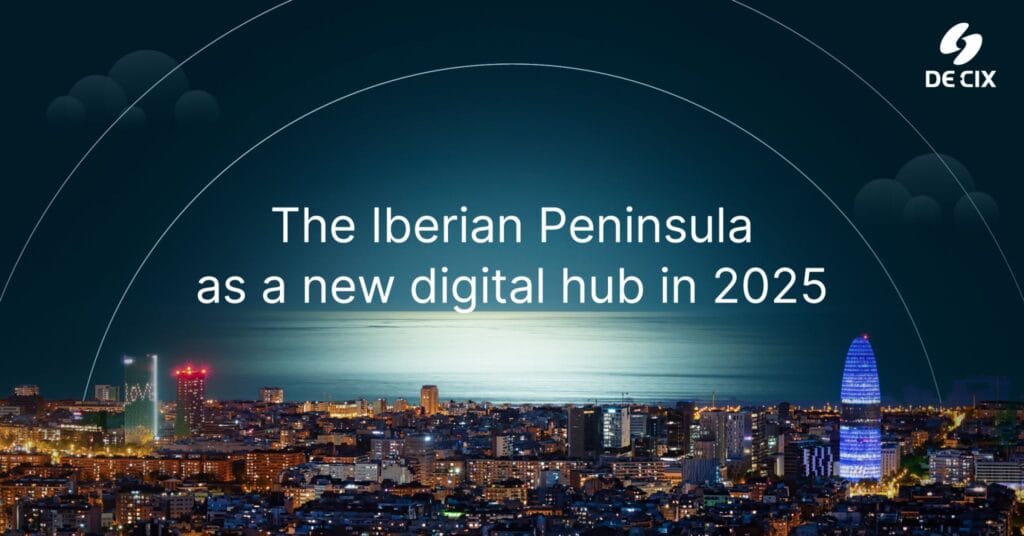The Iberian Peninsula is consolidating itself as a strategic digital hub on the global map, offering cutting-edge infrastructure and unprecedented connectivity. Looking ahead to 2025, this region is emerging as an attractive destination for companies seeking to optimize their localization strategies, driven by the economic, geographical, and digital advantages of the area. This is affirmed by Theresa Bobis, regional director for Southern Europe at DE-CIXDE-CIX (Deutscher Commercial Internet Exchange) is an entity…, who highlights the reasons to consider Iberia as a key point in business expansion.
Top-Tier Digital Infrastructure
Historically, European companies have centralized their digital operations in the markets of Frankfurt, London, Amsterdam, and Paris (known as FLAP markets). These hubs concentrate dense ecosystems of data centers, cloud services, and Internet exchanges, providing ideal conditions for digital operations. However, new alternatives such as Madrid, Lisbon, and Barcelona are quickly positioning themselves at the same level, with the additional advantage of a strategic location that connects Europe with America, Africa, and the Middle East.
According to recent studies by DE-CIX, the Iberian Peninsula has 35 international systems of underwater cables and 20 landing stations, providing competitive latencies that optimize global data flow. For example, Lisbon has latencies of 60 ms to Washington D.C. and 70 ms to Dubai, demonstrating its potential as an alternative route for international data traffic. These connections enhance Iberia’s position as a crucial digital node for data flowing between continents.
Business Benefits of the Iberian Peninsula
Beyond its digital infrastructure, Iberia offers appealing factors ranging from a strong transportation infrastructure and a skilled labor market to a favorable tax environment. With nearly 60 million inhabitants, the region is home to over 100 operational data centers and many more in planning, which supports the growth of the digital economy. Additionally, Madrid is the headquarters of most Spanish multinational companies, with a GDP growth of 23.24% since 2016, reaching €261.7 billion in 2023.
Throughout the peninsula, the cities of Bilbao, Valencia, Málaga, and Porto, along with Madrid, Lisbon, and Barcelona, form a “mega hub” that enhances resilience and optimizes connectivity in Europe. This distributed infrastructure ensures that companies seeking reliability and redundancy in their digital operations find an ideal complement to traditional European hubs in Iberia.
Global Connectivity and Sustainability
The push towards sustainability is another differentiating factor for the Iberian Peninsula. With a high percentage of energy generated from renewable sources such as hydroelectric, solar, and wind, Spain and Portugal provide a clean energy base for data centers. In Sines, Portugal, the largest complex of data centers powered by renewable energy in Europe is being built, in line with commitments from major cloud providers seeking to reduce their carbon footprint.
Additionally, the region boasts 13 Internet exchanges (IXs) that allow for direct interconnection between local and international networks, optimizing traffic flows and ensuring redundancy in connectivity. These IXs not only connect Iberia with Europe but also with Africa, the Middle East, and America, thereby expanding the reach of companies choosing to establish themselves in the region.
A Promising Future for the Iberian Peninsula
For companies seeking a strategic location in Europe, the Iberian Peninsula has become an attractive option that combines top-tier infrastructure, sustainability, and a favorable economic environment. DE-CIX, with its network of IXs distributed across Southern Europe and robust infrastructure that includes key cities like Madrid, Lisbon, and Barcelona, is driving the transformation of the region into a digital mega hub.
In summary, the Iberian Peninsula positions itself as a top-tier destination for global companies, providing not only a gateway to Europe but also a node that connects the Atlantic and Mediterranean with data routes to Africa, America, and beyond. With these advancements, Iberia promises to play a fundamental role in shaping the global digital future, attracting companies that seek efficiency, connectivity, and sustainability in their operations.
Download the study at De-cix

